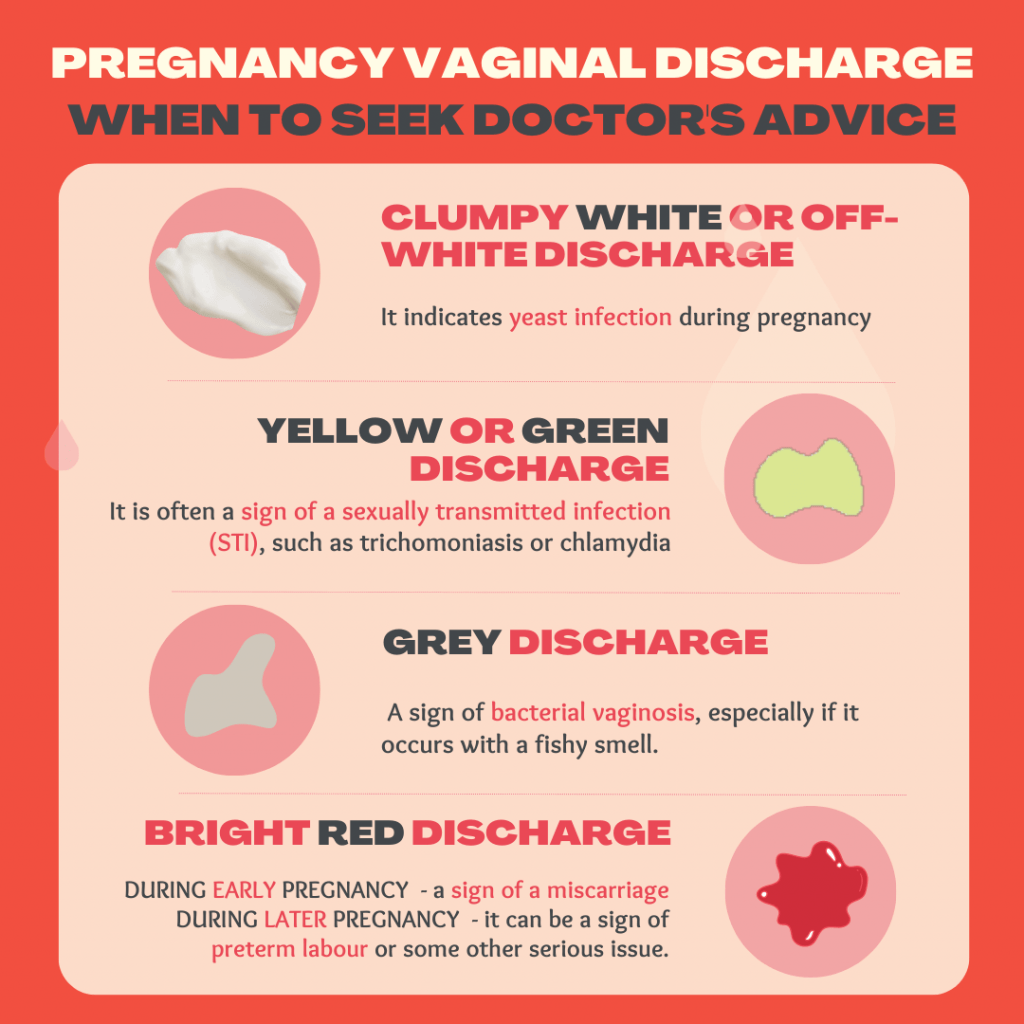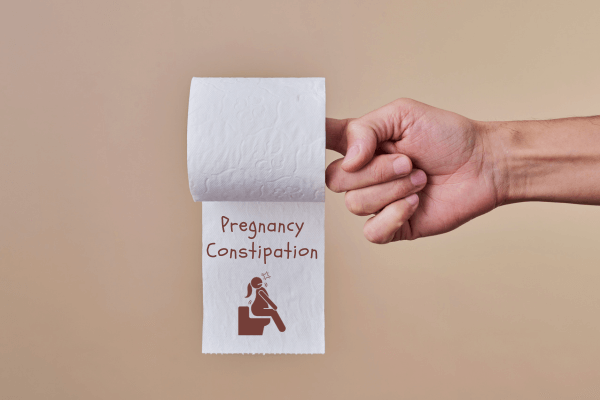What is vaginal discharge?
Vaginal discharge is a common cause of concern during pregnancy. However is perfectly normal and natural. It is a fluid that helps keep the vagina clean and infection-free. Its color, texture, and amount can differ depending on your age and where you are in your menstrual cycle. During pregnancy, vaginal discharge will increase and may vary in consistency, thickness, frequency, and amount due to natural changes in estrogen levels. Typical vaginal discharge during pregnancy is called leukorrhea and is thin, white, milky, and mild smelling.
In this guide, we’ll discuss types of vaginal discharge in pregnancy, how to deal with it, and when to consult a healthcare professional.
Is having Vaginal discharge during pregnancy normal?
Vaginal discharge is a normal part of a woman’s menstrual cycle as well as pregnancy. It may even increase considerably during pregnancy. So yes, having discharge may be pretty normal throughout the pregnancy. However, it may change as the pregnancy progresses. What is crucial to know is what constitutes a normal discharge during pregnancy and what constitutes a cause of concern.
Does vaginal discharge change during pregnancy?
Yes, vaginal discharge changes during pregnancy. One of the earliest signs of pregnancy is an increase in vaginal discharge, and this continues throughout pregnancy. The volume of discharge increases throughout pregnancy to reduce the risk of vaginal and uterine infections.
Types of Vaginal Discharge during Pregnancy
Women may experience different types of pregnancy discharge from their vagina.
Clear, thin, or slightly milky white discharge is quite common in pregnancy, which is termed Leukorrhea. It may be odourless and mild-smelling. As the pregnancy progresses, the amount of Leukorrhea may also increase. However, an increase in the quantity or thickness of Leukorrhea in the early pregnancy may sometimes suggest preterm labour.
Pink vaginal discharge during pregnancy may sometimes be a cause of concern. However, it may be completely normal as well. Early on, pink discharge may be a early sign of pregnancy. In the final weeks, it can be a sign of labour. However, in the first few weeks, it may sometimes be a sign of miscarriage or an ectopic pregnancy, which calls for regular check-ups to be on the safer side.
Brown vaginal discharge during pregnancy can be common in the early weeks of pregnancy as old blood leaves the body. However, a very dark brown discharge calls for a doctor consult.
If you see any of the below discharges, we advise you to seek your doctor’s advise.
- White: White or off-white discharge that is lumpy may indicate a yeast infection during pregnancy.
- Grey: It can be a sign of bacterial vaginosis, especially if it occurs with a fishy smell.
- Green or Yellow: Green or Yellow discharge is not normal and is often a sign of a sexually transmitted infection (STI), such as trichomoniasis or chlamydia.
- Bright Red: In the first few weeks, bright red blood may be a sign of a miscarriage, especially if it is accompanied by clots and cramps in the lower abdomen. Later on in the pregnancy, it can be a sign of preterm labour or some other serious issue.
How to Deal with Vaginal Discharge in Pregnancy?
While Vaginal or Pregnancy discharge or Leukorrhea is a common pregnancy symptom it can cause discomfort. Here are some things you can do to make it easier on you: :
- Avoid tight fitting underwear.
- Wear cotton underwear to allow your skin to breathe.
- Use pads or pantyliners if the discharge increases. Keep some handy in your bag.
- Do not use any cleaning products for the vagina. This includes douches, vaginal washes, wipes, etc. The vagina is self-cleaning, and these products may cause irritation.
- Bathe regularly and change the undergarments daily.
When to call the doctor about vaginal discharge during pregnancy
If you have leukorrhea, it’s normal but if it increases suddenly or you notice a change in texture, notify your doctor. All the other types of discharge should be brought to your doctor’s notice. In case you notice fresh blood, contact your doctor immediately.
During pregnancy, it’s important to pay attention to vaginal discharge. If you notice an increase in the amount of vaginal discharge or a change in the type of discharge before 37 weeks of pregnancy, or if you experience heavy bleeding accompanied by pain or contractions, you should contact your doctor immediately. Abnormal discharge, such as yellowish, greenish, blood-tinged or thick and cheesy discharge; a foul or fishy odor; burning or itching; or painful sex may indicate an infection or sexually transmitted disease and should also be reported to your healthcare provider. Excessive watery discharge could be a sign of leaking amniotic fluid and should also be reported. However, most often pregnancy discharge is normal and serves to protect you and your baby.
If you are pregnant and have any questions or concerns about vaginal discharge, you can also reach out to a Veira Coach. Veira Coaches are experienced doulas, midwives and lactation consultants who can provide you with personalized support and guidance. They can answer your questions, help you develop a plan for your pregnancy, and provide you with emotional support.
To learn more about pregnancy support services at Veira including Veira Coaches, please visit our website or contact us today.
FAQs
Any concerns should always be brought to your doctor’s attention.
Normal pregnancy discharge is usually thin, transparent and clear.
Yes, some form of vaginal discharge is common throughout the pregnancy.
Light bleeding or brown discharge may be normal in early pregnancy. But it must always be brought to your doctor’s notice so that things can be monitored well. Bright red discharge, however is a cause for concern.
Yes, you can let your doctor know about any concerns you might have about your vaginal discharge. Pregnancy is the most joyous period of a woman’s life. However, pregnancy comes with a host of symptoms that may leave women perplexed. At Veira Life, we understand the anxiety that pregnant women go through. Therefore, we do our best to provide you with all the information and resources you will need at each stage of your pregnancy and ensure you receive personalised and holistic support from experts.








